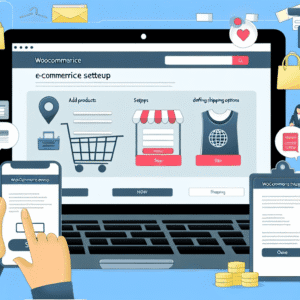The world is rapidly changing, and so is the way we do business—especially in Nigeria. With a burgeoning population of tech-savvy consumers, e-commerce presents a golden opportunity for small businesses to thrive. But how do you navigate this competitive landscape? In 2025, sufficient preparation and the right strategies can catapult your small business into the spotlight. Let’s dive into some practical strategies that will help you unlock e-commerce success in Nigeria.
1. Embrace Mobile Commerce
By 2025, mobile phone usage will be even more prevalent in Nigeria, with a significant percentage of e-commerce transactions occurring via mobile devices. So, what does this mean for your business?
Mobile Optimization
Make sure your online store is mobile-friendly. This means having a responsive website design that looks great on any screen size. The easier it is for customers to navigate your products on their smartphones, the more sales you’ll see!
Mobile Payment Options
Incorporate popular mobile payment gateways like Flutterwave, Paystack, or even crypto options. Customers prefer quick, hassle-free transactions that can be completed in just a few taps.
2. Leverage Social Media Marketing
Social media has transformed how Nigerians shop. By 2025, platforms like Instagram, Facebook, and TikTok will be crucial avenues for driving traffic and sales to your online store.
Content is King
Create engaging and relatable content that resonates with your target audience. Showcase your products through rich visuals and stories that capture their attention.
Social Commerce
Utilize features like Instagram Shopping and Facebook Shops to let customers buy directly through social media. This streamlines the shopping experience and leverages your followers for sales.
3. Localize Your Marketing Efforts
Nigeria is a diverse nation with over 250 ethnic groups and multiple languages. Tailoring your marketing strategy to speak directly to local consumers can yield higher engagement and sales.
Language Matters
If your target audience primarily speaks Yoruba, Hausa, or Igbo, consider translating your website and advertisements to cater to these audiences.
Cultural Relevance
Align your marketing campaigns with local holidays or events to captivate your audience. For instance, promotions during Sallah or Christmas can boost your visibility and sales.
4. Invest in SEO and Content Marketing
Search Engine Optimization (SEO) will be more critical in 2025. Understanding how customers search for products online can position your business at the top of search results.
Keyword Research
Identify keywords that your potential customers are using to find products in your niche. Incorporate these keywords naturally into your site’s content.
Quality Content
Create informative blogs, guides, and videos that not only showcase your products but also add value to your potential customers. The more helpful your content, the more traffic you’ll attract to your site.
5. Enhance Customer Experience
A seamless customer experience is crucial. By 2025, customers will have higher expectations about how they interact with e-commerce platforms.
User-Friendly Website
Ensure your website features an intuitive layout, easy navigation, and minimal loading times. A clunky site drives customers away—keeping it simple will keep them around.
Responsive Customer Service
Provide multiple channels for customer service, including live chats, social media, and email. Quick responses to inquiries can significantly enhance customer satisfaction.
6. Build Trust with Secure Transactions
Security has become a fundamental concern for online shoppers. If customers are unsure about the safety of their transactions, they’ll likely abandon their carts.
Secure Payment Gateways
Invest in reliable and secure payment gateways that offer encryption and safety assurances. Display trust badges and customer reviews prominently on your website to reassure visitors.
Clear Return Policies
Establish a clear and fair return policy. Customers appreciate transparency, which builds trust and encourages them to shop more confidently.
7. Network and Collaborate
Building partnerships with other businesses can expand your audience and create fresh opportunities. Collaborations can take many forms—from joint marketing campaigns to product bundles, so get creative!
Local Influencers
Engage local influencers who align with your brand values. Their endorsement can provide immediate credibility and expose your business to new audiences.
Community Engagement
Participate in local events or markets. Offline visibility can complement your online presence and build a loyal local customer base.
8. Utilize Data Analytics
As you grow, you’ll likely gather an enormous amount of data. Learning to interpret and utilize this data is crucial for making informed decisions about your business strategy.
Customer Insights
Use analytics tools to gain insights into customer behavior, preferences, and purchasing patterns. This information can guide your marketing efforts and product offerings.
Performance Tracking
Regularly assess which marketing channels are yielding the best results. Adjust your strategies based on performance data to continually optimize your approach.
Conclusion
E-commerce offers immense potential for small businesses in Nigeria. By adopting innovative strategies, focusing on a superior customer experience, and leveraging local connections, you can carve out a successful online presence in 2025 and beyond. Don’t navigate these waters alone; teams like Nikenga Web Services can help you with managed hosting, marketing, and development.
FAQs
1. How can I budget for e-commerce marketing?
Start by analyzing your revenue and allocating a percentage towards marketing. As you grow, adjust your budget based on what strategies yield positive results.
2. What are the best platforms for e-commerce in Nigeria?
Popular options include Shopify, WooCommerce, and Jumia. Evaluate each based on your specific needs, such as payment options and customization.
3. How can I drive traffic to my website?
Utilize SEO, social media marketing, and influencer partnerships. Consider paid advertising if it fits within your budget.
4. Is customer service important in e-commerce?
Absolutely! A positive customer experience can lead to repeat business and word-of-mouth referrals, which are invaluable.
5. What steps should I take to secure my website?
Use SSL certificates, secure payment processors, and regularly update your software. Building trust is key!
Call to Action
Ready to elevate your e-commerce game? Try Nikenga Web Services for managed hosting, marketing, and development. Let’s work together to unlock your business’s full potential!




